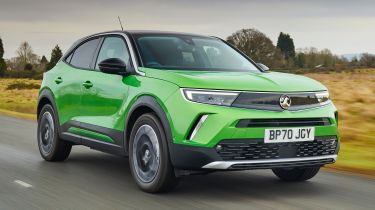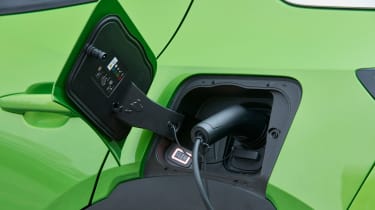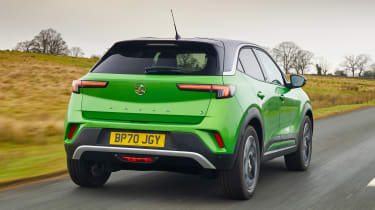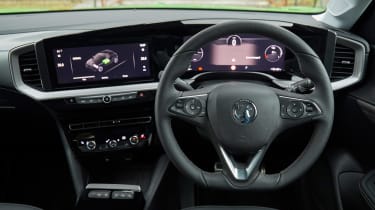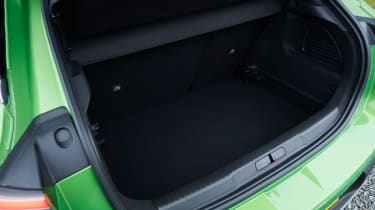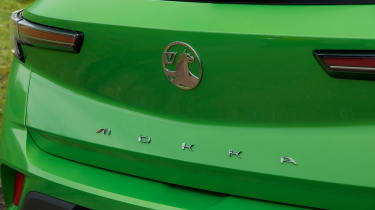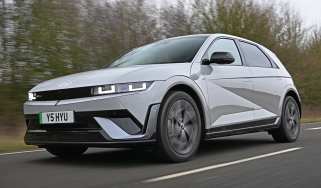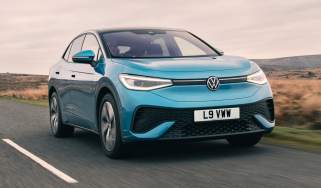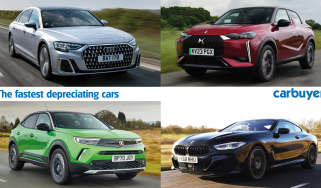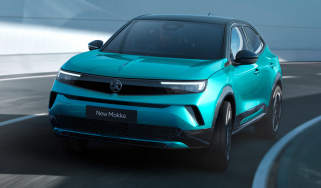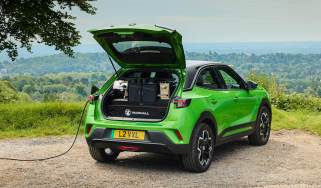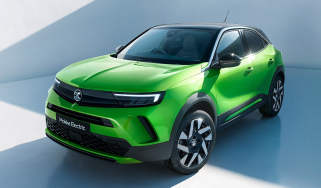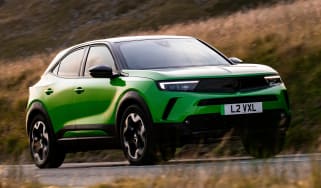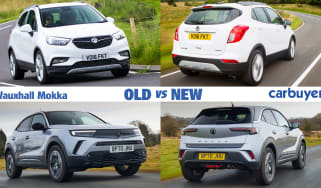Vauxhall Mokka Electric SUV review
"The plug-in Vauxhall Mokka Electric looks great and is designed to feel like a petrol car"
Pros
- Smart design
- Generous kit list
- Fast charging available
Cons
- Cramped interior and boot
- Not much fun to drive
- Rivals offer more for the money
Is the Vauxhall Mokka Electric a good car?
The Vauxhall Mokka Electric is a small, no-nonsense electric SUV that’ll appeal to those who want an EV that drives like a traditional petrol car. However, with so many strong rivals, it’s hard to find a reason why you’d pick it over something else. While we haven’t driven the updated model yet, an increased range and a more-powerful electric motor are welcome additions for 2023.
Vauxhall Mokka Electric range
Forget the old Vauxhall Mokka X with its dowdy styling and fossil fuel-burning engines, the Vauxhall Mokka Electric is here with sharp styling, the latest interior technology and a well-proven electric powertrain from Stellantis, the group that now owns Vauxhall.
Previously called the Mokka-e, the Mokka Electric looks very similar to the petrol-powered Vauxhall Mokka, meaning it gets the striking 'Vauxhall Vizor' front-end design, which has also made its way onto the facelifted Vauxhall Crossland and the new Vauxhall Astra. It also gets the brand’s new ‘Pure Panel’ infotainment setup, which features two screens, measuring 10- and 12-inches respectively.
 Top 10 best electric SUVs – the ones to buy in 2025
Top 10 best electric SUVs – the ones to buy in 2025
While the standard Mokka has to fend off rivals from nearly every manufacturer, the Electric has far fewer competitors, for now. It’s mechanically identical to the Peugeot e-2008, Citroen e-C4 and DS 3 Crossback E-Tense, and undercuts cars like the Hyundai Kona Electric and Kia Niro EV on price. The Mokka Electric’s size and style might also lead you to cross-shop it with small electric superminis like the MINI Electric, Renault ZOE or even Vauxhall’s own Corsa Electric.
More reviews
Vauxhall updated the Mokka Electric for 2023 with a larger battery and more-powerful electric motor, following similar upgrades made to the Peugeot e-208 – another mechanical sibling of the small Vauxhall EV. This has resulted in an increase in range to 252 miles on a single charge (an improvement of 43 miles).
From launch there were only two trim levels to choose from: GS Line and Ultimate, but in late 2023 Vauxhall introduced a new Design entry-level trim, previously only available on petrol models. As a result, the Mokka Electric now starts from just over £36,500.
Range, charging & running costs
The Mokka Electric originally used a 50kWh battery shared with the Vauxhall Corsa Electric, providing a range of up to 209 miles on a single charge. We’ve come to find this is rather accurate on a relatively warm day in the UK, where the Mokka displayed a range of around 200 miles on its trip computer.
Vauxhall increased the size of the Mokka Electric’s battery for 2023, though, rising to a capacity of 54kWh. This bump in battery size has increased range to 252 miles on a single charge, which is a welcome improvement over the old car. Still, it doesn’t quite match the 280 miles possible in the Kia Niro EV, which is only slightly more expensive and much more practical.
No matter whether you have a pre- or post-update Mokka Electric, all come as standard with 100kW fast charging capability. This allows for a 10-80% top up in around 30 minutes when connected to a public fast charger. Charging from a 7kW wallbox at home is much cheaper, though, and this can be completed in around 7.5 hours.
If you’re a company car driver after a Vauxhall Mokka, the Electric is the best in the range thanks to its low Benefit-in-Kind tax rating. EVs are also exempt from paying VED (road tax) until 2025, which should further cut down on running costs.
Meanwhile, the three-year/60,000-mile warranty is similar to rival models, although the battery pack is covered for eight years or 100,000 miles. Vauxhall offers a three-year servicing package – but that may only cover two services as the Mokka-e needs an initial inspection after 8,000 miles or a year, and then needs servicing every 16,000 miles or two years thereafter. Another Mokka-e perk seems to be complimentary roadside assistance for eight years, which could add up to quite a saving.
Electric motor, drive & performance
Unlike some electric cars and hybrids that have several motors, the Mokka Electric's layout is very simple. At launch there was a single 134bhp electric motor under the bonnet, driving the front wheels via just one forward gear. To set off, you simply choose drive or reverse, like in an automatic car or even a golf buggy for that matter. Unlike most EVs, you don’t get the feeling that all the power is there instantly, as Vauxhall has tried to make the car feel more like a standard petrol or diesel car in terms of its power delivery. Still, the 8.7-second 0-62mph time is quicker than any other petrol or diesel Mokka. Top speed is limited to 93mph – at which speed (were it legal) the battery would drain rather quickly.
Vauxhall has fitted a punchier electric motor for 2023, with an output of 154bhp; although acceleration figures are yet to be detailed, we expect this boost in power should make the rather heavy Mokka Electric feel a bit more spry.
There are three driving modes: Normal, Eco and Sport. We'd set it to Normal and leave the button alone; the Mokka’s comfort-focused setup doesn’t lend itself to the extra power granted by Sport mode, while Eco mode limits power to preserve range, making the car feel somewhat sluggish. This is only really desirable around town or if you’re concerned about getting home or to a charger.
Like with the slightly reined-in acceleration, Vauxhall isn’t intent on making the Mokka the best-driving electric car. It feels stable and does well in soaking up bumps, but this focus on comfort doesn’t make the Mokka particularly good at quick direction changes. The MINI Electric certainly has more agility, while the Mazda MX-30 is also more rewarding to drive.
Interior & comfort
The old Mokka X had a rather dowdy interior, but it's all change for the latest generation Mokka. Gone are the dated instrument gauges, replaced by a 12-inch digital dashboard. This forms a horizontal swathe of information and is joined by a 10-inch touchscreen to its left, for a widescreen look that Vauxhall calls 'Pure Panel'. It's similar to the MBUX setup found in recent Mercedes models, albeit slightly more angled towards the driver.
DAB radio and Bluetooth are standard, along with Apple CarPlay and Android Auto, so no matter what phone you have, it should be possible to connect it with no issues. While you may be concerned about the multitude of hard plastics dotted around the cabin given the Mokka Electric’s high starting price, we do like the fact Vauxhall has given it physical climate control dials, which are easy to use when on the move.
While the Mokka Electric was initially only available in the two highest trims, GS and Ultimate, the brand introduced the entry-level Design trim usually available solely on petrol models to the EV version in late 2023. This gets the seven-inch digital gauge cluster, seven-inch infotainment display with sat nav, Android Auto and Apple CarPlay, 17-inch alloys, a rear-view camera, rear parking sensors and kit like lane departure warning and traffic sign recognition.
GS models get a host of red exterior accents (these can be deleted as a no-cost option), a contrasting black roof, as well as 18-inch alloy wheels, a larger 10-inch infotainment touchscreen and 12-inch digital gauge cluster, heated front seats and steering wheel and more advanced climate control.
Step up to the range-topping Ultimate and you’ll benefit from Matrix LED headlights, Alcantara suede upholstery, adaptive cruise control, keyless entry and start and wireless device charging.
Practicality & boot space
While front-seat occupants are bedazzled by Vauxhall’s cutting-edge infotainment, those in the rear are relatively deprived of much luxury. It all feels rather dark and with limited foot and headroom, the back seats are best reserved for children, or adults on shorter journeys.
The Mokka Electric’s boot measures 310 litres in volume, with 11 litres of space under the boot floor. That's the same as a petrol Vauxhall Corsa and 40 litres less than the standard Mokka. It’s a noticeable 70 litres less than you'd find in a family hatch like the Volkswagen Golf, so this is an SUV by name, not necessarily for how much it can haul. Fold down the rear seats and there's 1,060 litres available.
The mechanically identical DS 3 Crossback E-Tense, Citroen e-C4 and Peugeot e-2008 are all more practical; the Peugeot has more than 120 litres of extra boot space over the Mokka Electric. Meanwhile, the Kia Niro EV has a boxier shape, and boot space is a more practical 382 litres. The Mokka Electric's boot is, at least, far bigger than you'll find in a Honda e or MINI Electric.
Reliability and safety
While a combustion engine is full of moving parts, oil and fuel at incredibly high pressures and temperatures, all attached to a clutch and gearbox, an electric car has far fewer moving parts. In fact, the electric motor only drives a single forward gear, so the amount of wear and tear should be far less. There are advantages for the brakes and tyres too, because the dynamo effect of using the motor as a generator while slowing down decreases wear on consumables.
The standard Vauxhall Mokka came in 74th place in our Driver Power survey of the top 75 cars, with buyers praising its handling and drive, but rating its practicality and interior storage rather poorly.
Vauxhall as a brand could only place a mediocre 24th out of 32 manufacturers in our 2023 Driver Power customer satisfaction survey. Around 23% of owners reported a fault within the first year of ownership, which is about average across the board. Many were happy with the low running costs associated with the brand’s cars, several owners were displeased with their car’s practicality – a big sticking point for the Mokka Electric.
Every Mokka comes with an impressive roster of safety kit, including lane-keep assist, as well as autonomous emergency braking designed to mitigate or prevent collisions at speeds between 3mph and 53mph. This can detect both vehicles and pedestrians. The Mokka Electric should also be ideal for families, thanks to features such as ISOFIX rear child-seat mounting points and child-proof locks for the rear doors.

